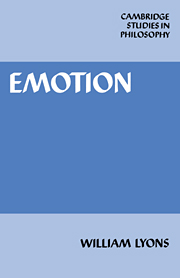Book contents
- Frontmatter
- Contents
- Preface
- Acknowledgements
- 1 Three classical theories of emotion: the feeling, behaviourist and psychoanalytic theories
- 2 A fourth classical theory: the cognitive theory
- 3 The causal–evaluative theory of emotions
- 4 The cognitive and evaluative aspects of emotion
- 5 The appetitive aspect of the emotions
- 6 The objects of emotions
- 7 Physiological changes and the emotions
- 8 Emotions and feelings
- 9 Emotions and behaviour
- 10 Emotion statements
- 11 Emotions and motives
- 12 Emotions and purpose
- 13 Blaming the emotions
- 14 Looking back: a summary
- Bibliography
- Index
8 - Emotions and feelings
Published online by Cambridge University Press: 03 December 2009
- Frontmatter
- Contents
- Preface
- Acknowledgements
- 1 Three classical theories of emotion: the feeling, behaviourist and psychoanalytic theories
- 2 A fourth classical theory: the cognitive theory
- 3 The causal–evaluative theory of emotions
- 4 The cognitive and evaluative aspects of emotion
- 5 The appetitive aspect of the emotions
- 6 The objects of emotions
- 7 Physiological changes and the emotions
- 8 Emotions and feelings
- 9 Emotions and behaviour
- 10 Emotion statements
- 11 Emotions and motives
- 12 Emotions and purpose
- 13 Blaming the emotions
- 14 Looking back: a summary
- Bibliography
- Index
Summary
There is a considerable literature which sets out the reasons why we should not equate feelings with emotions. I have set out some of these reasons when discussing the feeling theory in chapter I, but little work has gone into assessing the part that feelings do play in emotions. It is this latter task that I wish to engage in here.
So in this chapter,
(1) I draw out the implications as regards the link between feelings and emotions of a brief passage in Ryle's The Concept of Mind;
(2) I discuss whether certain feelings can be said to be associated invariably with certain emotions or not;
(3) I discuss whether our feeling terms are as neutral as has been supposed;
(4) I discuss some competing theories of how in fact we link feelings with emotions and the part feelings play in identifying emotions;
(5) I try to stress in a positive way the part that feelings play in occurrent emotional states.
Ryle and the link between feelings and emotions
Feelings do not come labelled as to what they are feelings of or as to what they are caused by. One labels them as feelings of something only by working out a cause or a content. So in the first place I am going to argue that one labels a feeling as of some emotion only after causally correlating it with the core or defining aspect of that emotion, namely the evaluations and desires peculiar to that emotion.
- Type
- Chapter
- Information
- Emotion , pp. 130 - 143Publisher: Cambridge University PressPrint publication year: 1980

